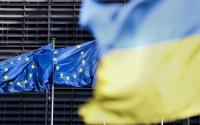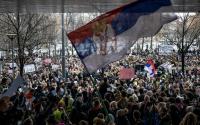14 May 2007Yahoo! NewsArshad Mohammed
U.S. Secretary of State Condoleezza Rice, seeking to repair strained ties with Russia, said on Monday she did not like its rhetoric towards Washington but said there were no grounds for talk of a new Cold War.
As she flew to Moscow to meet President Vladimir Putin, Rice conceded it was "not an easy time for the relationship," but said ties were nowhere near as bad as during Soviet times.
"I know people talk about, throw around terms like new Cold War. As somebody who came out of that period as a specialist in it I think the parallels ... frankly, they have no basis whatsoever," she told reporters.
Rice said she hoped to ease Moscow's concerns about U.S. plans to place 10 interceptors in Poland and radar in the Czech Republic as part of a missile defense shield for Europe.
She also hopes to allay Russian concerns about a plan to grant effective independence to Kosovo, which has been under U.N. administration for nearly eight years.
Russia is strongly opposed to both proposals, and Putin has accused the United States of seeking to impose its will on the rest of the world.
While acknowledging the strains, Rice highlighted areas where Russia and the United States cooperated, such as reining in nuclear programs in Iran and North Korea.
U.S. companies have been enjoying sharply growing profits in Russia, as its strong oil- and gas-fuelled growth enters its ninth consecutive year.
Russian officials say they are ready for calm and positive talks with Rice on her two-day visit, in contrast to the shrill exchanges of the past few months.
But Moscow -- flush with oil money and once again flexing its muscles as a world power just as Washington is mired in Iraq -- warned that it would not be dictated to by its U.S. visitor.
"We always call on our American partners to talk frankly and not try to force their point of view on others," Mikhail Kamynin, Russian foreign ministry chief spokesman, said.
"What we need is not briefings but joint work and a joint search for solutions."
Rice is the highest-ranking U.S. official to go to Moscow since Putin stunned the West with a speech in Munich in February in which he sharply criticized Washington's foreign policy.
NOT EASY
Rice said she did not like the rhetoric but also stressed the need to view U.S.-Russian ties in a wider context.
"It's not an easy time for the relationship. It's not," Rice said. "But it's also not a time in which ... catastrophic things are happening in the relationship. It's mixed."
"If you look at the actual ... facts on the ground and you look at the level of cooperation that we have had on North Korea, on Iran, if you look at the WTO agreement that we've signed with Russia ... it just doesn't accord with some of the rhetoric that does sometimes come out," she said.
"It's a big, complicated relationship, but it's not one that has anything like the implacable hostility which really did lead to zero-sum politics between the United States and the Soviet Union," she added.
Putin last month upped the stakes by saying Russia was suspending compliance with a conventional arms treaty, a move seen as the Kremlin's response to the U.S. missile shield plans.
On Kosovo, Russia's ambassador to the United Nations said at the weekend it was "becoming more and more likely" his country would veto a draft Security Council resolution -- backed by Washington -- that gives the province effective independence.
Washington has its own grievances with Russia, including concerns about what it sees as an erosion of democracy under Putin and complaints about the Kremlin's treatment of ex-Soviet neighbors who seek closer ties with the West.
But Rice said it would be a mistake for the United States to seek to isolate Russia, arguing that it is more likely to make progress on democracy and other issues if Moscow is included in Western institutions.






